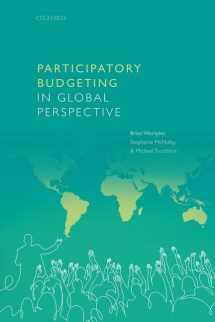
Participatory Budgeting in Global Perspective
Book details
Summary
Description
Participatory Budgeting continues to spread across the globe as government officials and citizens adopt this innovative democratic program in the hopes of strengthening accountability, civil society, and well-being. Governments often adapt PB's basic program design to meet local needs, thus
creating wide variation in how PB programs function. Some programs retain features of radical democracy, others focus on community mobilization, and yet other programs seek to promote participatory development. Participatory Budgeting in Global Perspective provides a theoretical and empirical
explanation to account for widespread variation in PB's adoption, adaptation, and impacts. This book develops six "PB types" to account for the wide variation in how PB programs function as well as the outcomes they produce. To illustrate the similar patterns across the globe, four empirical
chapters present a rich set of case studies that illuminate the wide differences among these programs; chapters are organized regionally, with chapters on Latin America, Asia, Sub-Saharan Africa, Europe, and North America. By organizing the chapters regionally, it becomes clear that there are
temporal, spatial, economic, and organizational factors that produce different programs across regions, but similar programs within each region. A key empirical finding is that the change in PB rules and design is now leading to significant differences in the outcomes these programs produce. We find
that some programs successfully promote accountability, expand civil society, and improve well-being but, too often, researchers do not have any evidence tying PB to significant social or political change.


We would LOVE it if you could help us and other readers by reviewing the book
Book review



